| Clutching My Pearls is my ongoing blog series about my take on Jane Austen’s beliefs and ideas, as based on her novels. Many modern Austen fans are eager to acquit her of being a woman of the long 18th century. Further, for some people, reinventing Jane Austen appears to be part of a larger effort to jettison and disavow the past. Click here for the first in the series. Why bring the slave trade into the novel at all? And then why, having done so, leave the topic hanging without resolution? -- Tom Keymer, Jane Austen: Writing, Society, Politics (2020) |
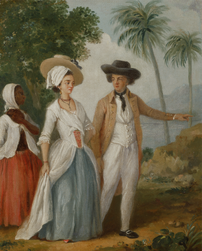 A West Indian planter
A West Indian planter Whether the critics (correctly) refer to the “dead silence” that falls after Fanny asks a question about the slave trade and her uncle replies, or whether they incorrectly relate that Fanny asked a question which her uncle didn’t answer, the conclusions vary wildly. The “dead silence” passage is used to prove that Austen didn’t care about slavery, or didn’t care enough about slavery, or cared passionately about slavery.
Today, we are more apt to read analyses of Mansfield Park which claim that far from ignoring slavery, the book is entirely about slavery, colonialism and empire. As Claire Harmon wrote in Jane's Fame, a history of Austen’s rise from moderately successful author to world icon, “Elements in the novel that hardly seemed to be noticed before by critics... have subsequently become, as Rajeswari Sunder Rajan has pointed out, the ‘locus of the novel’s meanings.’"
And as Tom Keymer writes in Jane Austen: Writing, Society, Politics, “It has become a novel about offstage episodes and unspoken themes; global rather than domestic.”
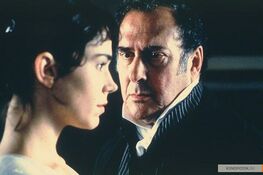 Creepy Sir Thomas and defiant Fanny in the 1999 movie adaptation
Creepy Sir Thomas and defiant Fanny in the 1999 movie adaptation Some scholars possess the ability to interpret the emotional colouring of the "dead silence" passage, yet they arrive at different interpretations. For one author, it’s “Fanny's timid question in Mansfield Park,” for another, it’s “Fanny Price's outburst about the treatment of slaves,” for another, Fanny "bravely makes her abolitionist sympathies clear." Another says Fanny expresses her "amazement" about the family's dead silence. Another claims: "Fanny boldly raises the issue with her uncle because she sees parallels between her own situation as a poor relation and that of his slaves. Sir Thomas’s “dead silence,” as well as that of his complacent family, shows up their moral blankness, not [Austen's]." An op-ed in the Washington Post describes the silence by claiming "Austen bluntly addresses enslavement. The good-guy hero Edmund Bertram wants the pure-hearted heroine Fanny Price to ask more questions about the slave trade and its pains, but she grows quiet, fretting about what others think."
Others have explained the Bertrams' silence as “ambivalence,” “guilt,” or resentment that Fanny would pick such as “ill-chosen topic” that is “too close to the bone.” Some examples:
|
Therefore, Austen could have been more explicit -- if she had chosen to be.
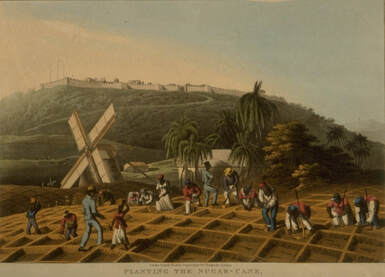 Planting Sugar Cane, Antigua
Planting Sugar Cane, Antigua Mrs. Norris talks about the "Antigua estate" making "poor returns." Sir Thomas's activities in the West Indies are only ever described as “his business” or “his affairs." Austen describes the length of his absence and reminds us of the danger of the voyage there and back again. When he does return, we are told he regales the family with tales of the West Indies. But apart from a mention of balls and dancing, there are no details.
His oldest son Tom had nothing to say on the subject of Antigua, except for suggesting that the dangerous return sea voyage their father must make, was a good excuse for putting on a play to ease their mother's supposed anxiety -- a suggestion that comically backfires when Edmund and Tom turn to see her dozing on the sofa.
We are told that when Sir Thomas returns, Fanny looks at him with tender sympathy, because he is haggard and has obviously suffered under the West Indian climate.
The focus throughout is the dangers and sacrifices that Sir Thomas undergoes, not the sufferings of the enslaved persons who, unlike their master, crossed the Atlantic stowed below decks in chains.
Overall, Austen gives us just enough detail to usher Sir Thomas off the stage when his absence is necessary for the plot, and to bring him back again when his presence is necessary for the plot. The word "sugar" does not appear in the book and "plantations" refers to the cultivated ground in Mansfield, not Antigua.
How to reconcile Austen's emphasis on pleasure with the assertion that there is a daring but long-overlooked anti-slavery message in the novel? There is no hint that Fanny is accusing or badgering her uncle when she asks him about the slave-trade, though modern critics have inserted that inference. She is not the Regency equivalent of the vegan granddaughter lecturing everybody at Thanksgiving. Clearly Fanny is not listening to his information with horror or disapproval. How to reconcile this with the idea that Fanny challenges Sir Thomas?
One interpretation that I find very plausible, neither condemns Austen as indifferent to slavery nor builds her up into an abolitionist Total Badass. It is a more nuanced interpretation based on the slavery debate as it was waged in Austen's time.
Previous post: The "Dead Silence" Next post: Amelioration
| James Stephen (1758 - 1832), a lawyer, legislator, and abolitionist with a pretty amazing personal backstory, makes an appearance in My Mansfield Trilogy. Click here for more about my books. |
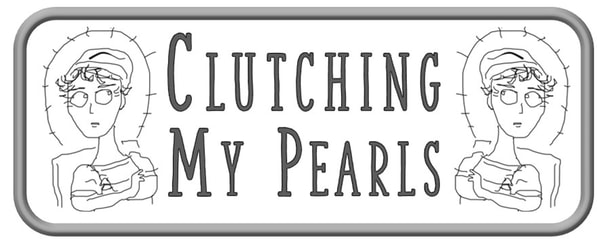
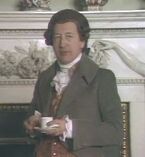
 RSS Feed
RSS Feed